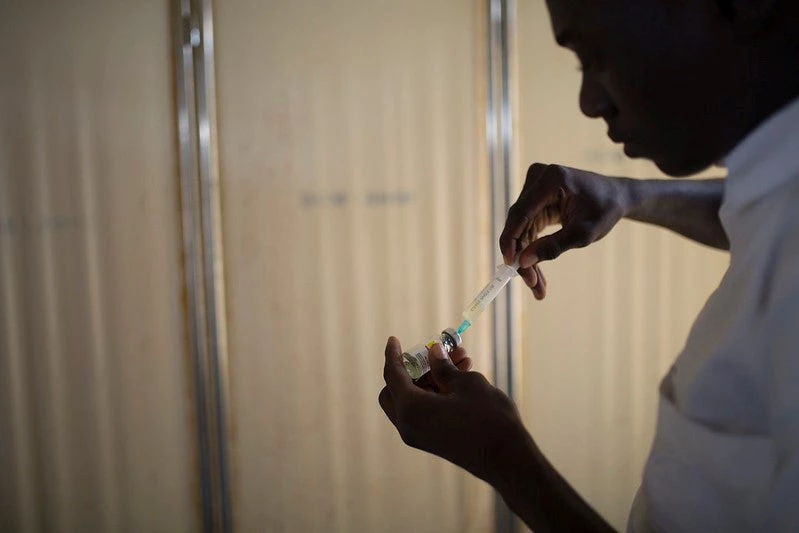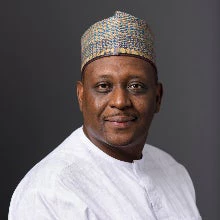 Community health practitioner prepares to give an injection at the Airport Clinic in Minna, Nigeria on June 22, 2018. Photo © Dominic Chavez/The Global Financing Facility
Community health practitioner prepares to give an injection at the Airport Clinic in Minna, Nigeria on June 22, 2018. Photo © Dominic Chavez/The Global Financing Facility
Providing fair and equal access to a future COVID-19 (coronavirus) vaccine is the right thing to do
The COVID-19 pandemic is unlike any other global health crisis and the most challenging the world has faced since the Second World War. Spreading across 200 countries and territories, the virus has infected more than 2.5 million people, killing over 170,000 and forcing countries into economic crisis as well. It has destabilized the global economy, exposed the weakness of health systems, and upended the lives of billions around the globe. Our own estimates indicate that at least 50 million people will fall into extreme poverty as a result of it.
As we head into World Immunization Week, we need to come together to find a more effective response to the virus by funding and developing a vaccine. We may be months away from achieving this goal, but the hope that the world will get through this crisis hinges on the availability of a vaccine.
Working together to develop a vaccine
In February, the Coalition for Epidemic Preparedness Innovations (CEPI) joined with the World Bank and other partners to launch a COVID-19 Vaccine Development Taskforce , with a focus on the financing and manufacturing of vaccines for global access.
While some progress has already been made, CEPI estimates that additional funding of $2 billion will be needed to develop up to three vaccines over the next 12-18 months. This estimate does not include the costs of manufacturing or delivery.
Given the enormous health, social, and economic consequences of the pandemic, it is in all our interests to work collaboratively and help provide the necessary financing. We know from past experiences that direct government contributions and innovative finance mechanisms have successfully helped raise funds for vaccines. The same approach should apply today.
The World Bank also supports the new COVID-19 accelerator initiative announced by several of our partner organizations to speed the development, production and equitable access to new COVID-19 diagnostics, therapeutics and vaccines.
A fair global allocation system
In addition to sufficient financing, we need to put in place a fair global allocation system to ensure that all countries, including the poorest, have equal access to vaccines once they are available. Three guiding principles will be key: working quickly, manufacturing and deploying the vaccine at scale, and ensuring global access. Several colleagues and I laid out these principles in more detail in a recent article in The Lancet.
At the World Bank, we have started a massive COVID-19 response, with financing of up to $160 billion over the next 15 months to support countries across all regions as they address the immediate health needs and mitigate the near- and longer-term economic and social impacts of the pandemic.
We are funding part of the work done by CEPI to speed up the development process and help lower the cost of manufacturing. Nevertheless, we will need additional financial support from the public and private sectors as well as philanthropies.
Our vision is to see the vaccines developed at a large scale and distributed for free, through a reasonable and objective process. Vaccines should first be made available in stages to different population groups — prioritizing health care workers at the front lines of the COVID-19 response as well as people at greatest risk of severe illness and death.
We cannot afford to let high-income countries monopolize the global supply of COVID-19 vaccines, as happened during the 2009 influenza A/H1N1 pandemic. The poorest and most vulnerable countries and populations cannot be left behind. A far better solution would be for the global community to ensure that there is a globally fair allocation system.
The private sector has an important role to play
The rudiments of this system would require a global purchasing agent, access to financial instruments, and indemnification from liability to offset the risks taken by participating private sector partners. IFC, the World Bank Group’s private sector arm, is well positioned to lead this effort. It stands ready to support the expansion of manufacturing capacity and to co-sponsor global access to the vaccines.
At the World Bank, our goal is to make investments that strengthen and facilitate the delivery of vaccines to populations across the world, especially those who need it most.
To stop this virus, we can’t do it alone. We need to act together because it is in everyone’s interest.
This is a moral imperative: quite simply, it is the right thing to do.


Join the Conversation